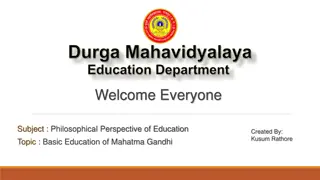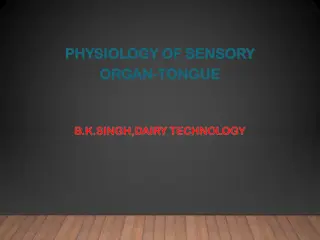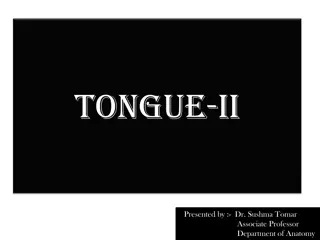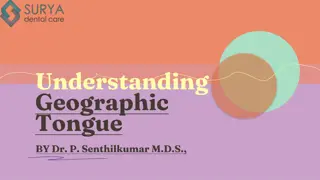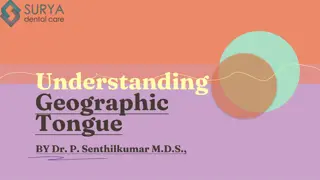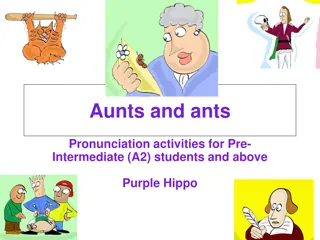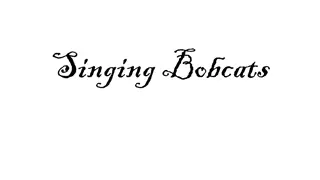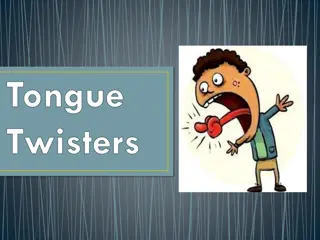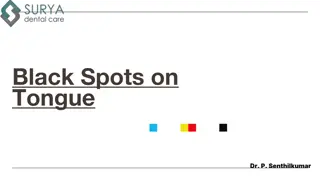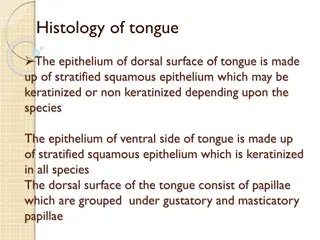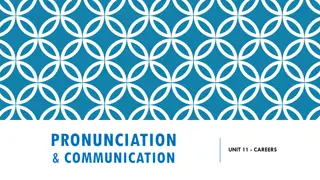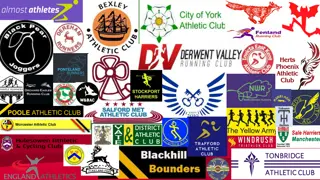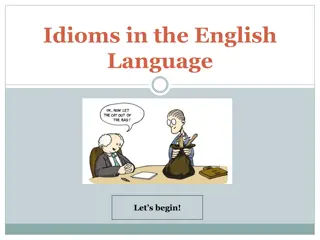Slang, Idioms, and Tongue Twisters
Explore the world of slang, idioms, and tongue twisters to better understand informal language expressions. From slang used by specific groups to popular idioms recognized by the public, delve into the nuances of language diversification. Discover examples, rationale for difficulties, and fun tongue twisters that challenge pronunciation skills.
Download Presentation

Please find below an Image/Link to download the presentation.
The content on the website is provided AS IS for your information and personal use only. It may not be sold, licensed, or shared on other websites without obtaining consent from the author.If you encounter any issues during the download, it is possible that the publisher has removed the file from their server.
You are allowed to download the files provided on this website for personal or commercial use, subject to the condition that they are used lawfully. All files are the property of their respective owners.
The content on the website is provided AS IS for your information and personal use only. It may not be sold, licensed, or shared on other websites without obtaining consent from the author.
E N D
Presentation Transcript
Definition informal words and expressions that are not considered standard in the speaker s language. Proper grammar is not always used. Definition: : Slang is the use of informal words and expressions
Rationale difficulty understanding and interacting with native speakers because the nature of native speakers language differ academic language that is used in the classroom. Rationale: : EFL learners have difficulty understanding and interacting with native speakers the nature of native speakers language differ from the academic language that is used in the classroom. EFL learners have from the
Brainstorm the reasons why you may have difficulty fully understanding a native speaker s language. Give examples of slang language. Ask yourself whether you have problems understanding conversations in American (or other English-speaking) movies. If so, why? Is this what bottoms up means? If so, why?
What an awesome sunset today. The whole idea was a bust. More than twenty companies went bust. My new car is a lemon. This is a really cool place to work. I need more time to cram for the test. She has a really cushy job. I m psyched! I m broke. http://www.vocabulary.co.il/idioms/ Others?
Slang: particular group of people Emo My bad Slang: words and phrases associated with a particular group of people (e.g., young people) Emo My bad Idioms: public Every cloud has a silver lining / Spreading myself too thin Idioms: words and phrases recognized by the public- -at Every cloud has a silver lining / Spreading myself too thin at- -large large. Slang Slang and idioms idioms are similar in meaning
Definition phrases because they have many same sounding words Definition: : Tongue twisters are phrases that are difficult to say difficult to say many same sounding words. She sells sea shells by the seashore. She sells sea shells by the seashore.
Rationale Tongue Twisters help in practicing pronunciation Rationale: : practicing pronunciation. May help ELL students to improve their English language accent. improve their English language accent.
Toy boat. Toy boat. Toy boat. Good blood, bad blood. Peter Piper picked a peck of pickled peppers. World Wide Web Fuzzy Wuzzy was a bear. Fuzzy Wuzzy had no hair. Fuzzy Wuzzy wasn't fuzzy, was he? How much wood would a woodchuck chuck if a woodchuck could chuck wood? http://www.uebersetzung.at/twister/en.htm "Stop it! Stop it! That's enough, sir. Fox in Socks. 1965 "Stop it! Stop it! That's enough, sir. I can't say such silly stuff, sir." (Dr. Seuss, I can't say such silly stuff, sir." (Dr. Seuss, Fox in Socks . 1965)
www.robdanin.com Thanks for trying Thanks for trying & &

 undefined
undefined




